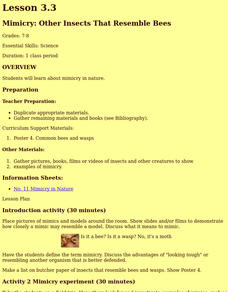Curated OER
We're Counting At The Zoo!
Budding mathematicians use sets of concrete materials to represent, count, and match quantities to 10 or more given in verbal or written form while participating in hands-on activities. This instructional activity uses the book 1,...
Curated OER
More Than or Less Than?
How many apples is less than five? Each of these problems has two images, one with quantifiable details and one without (i.e. a tree with apples and an empty tree). Answers will vary as young counters draw objects onto the second image...
Curated OER
Reading Numbers
Teach number value to 20 through sets of objects. Young pupils use the number given for each of the four sets to determine how many should be colored in. How many are left? There is an addition box that has been left blank so scholars...
DK Publishing
Addition: Count and Color, part 2
Introduce young counters to addition through coloring as they examine number sentences represented by sets of objects. Learners count the two addends and color in the sum by counting out the total in a final set. There is an example, and...
DK Publishing
Addition: Count and Color, part 3
Approach addition with sets of objects to show scholars the operation visually. There are four sets of images here arranged as addends in an addition number sentence. Learners count them and color in the total in a final set. All answers...
DK Publishing
Number Sentences Multiplying by 3
How many sets of eggs? Approach multiplication through sets of, in this case, three objects. Learners fill in blanks to complete a number sentence in two forms: ___ sets of 3= ___ and ___ x ___ = ___. There is an example they can...
Curated OER
English as an Additional Language: Topic Book 13 The Family 1
In this ESL family worksheet, students respond to 30 matching questions, 50 short answer questions, and 27 drawing questions pertaining to colors, directions, counting, and identifying common objects.
Curated OER
Secret Kiwi And His Friends
Young scholars follow a piece of tape around the school and write down the items they see. In this observations lesson plan, students discuss what they saw and didn't see based on other's observations.
Curated OER
My Own Backyard
Students explore and react to the painting The Road to Santa Fe. In this interacting with art lesson, students locate various objects in the painting. Students copy the angle of objects by using their bodies. Students discuss...
Curated OER
Candy Land Math
Students order numbers and sets of objects from 0 through 10 and organize and interpret information collected from the immediate environment. They read and interpret graphs usin real objects and the computer. Finally, students sort a...
Curated OER
Make a Graph challenge
In this making a graph worksheet, students observe a group of objects, complete a graph by coloring a box for each item that is like the solid shape shown, and write the total number of shapes.
Curated OER
Taking Away to Subtract
In this subtraction activity, students cross out the pictures in each set to complete the subtraction sentence. students write the number of pictures left in the 30 problems.
Curated OER
Mimicry: Other Insects That Resemble Bees
Learners design a conceptual experiment to test whether mimics actually benefit from the fact they resemble other organisms or objects. They define the term mimicry. They focus on insects that resemble bees and wasps.
K12 Reader
Extending Patterns
2, 4, 6, 8. What comes next? This reading comprehension activity discusses patterns and extending patterns. After reading the short article, kids answer a series of questions to demonstrate their understanding of the passage.
Curated OER
Prime Numbers
In this prime numbers worksheet, students read facts and complete comprehension activities. In this graph construction and drawing worksheet, students complete two activities.
Curated OER
Adjective Riddles
Students create a riddle using adjectives to describe an unknown edible substance to their classmates.
Curated OER
Adjective Riddles
Young scholars create adjective riddles for various candies. They describe the sound, taste, appearance, and smell of the candy, using at least 10 different adjectives. Classmates try to guess the candy name.
Curated OER
"Julie of the Wolves"
Fifth graders research life in Alaska and compare life there to their lives in this lesson. They read "Julie of the Wolves." They research through the novel and other reference books facts about the Alaskan climate and geography. They...
Curated OER
I Think I Forgot Something!
Young scholars examine human health by reading a children's book in class. In this breakfast lesson, students identify the importance of starting the day with a good, nutritious meal. Young scholars read the book I Think I Forgot...
Curated OER
Investigating: Finding the Volume
Sixth graders explore geometry by utilizing colored cubes in class. In this volume activity, 6th graders identify the different shapes they can create using their colored cubes and identify the formula for finding volume. Students create...
Curated OER
Essential Narrative Concepts
Students interact with the main concepts of a narrative text in the six lessons of this unit. The setting, prediction, retelling, sequencing, and the identification of the beggining, middle and end of a story are investigated.




















